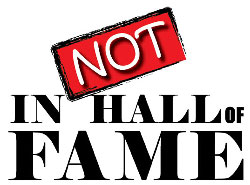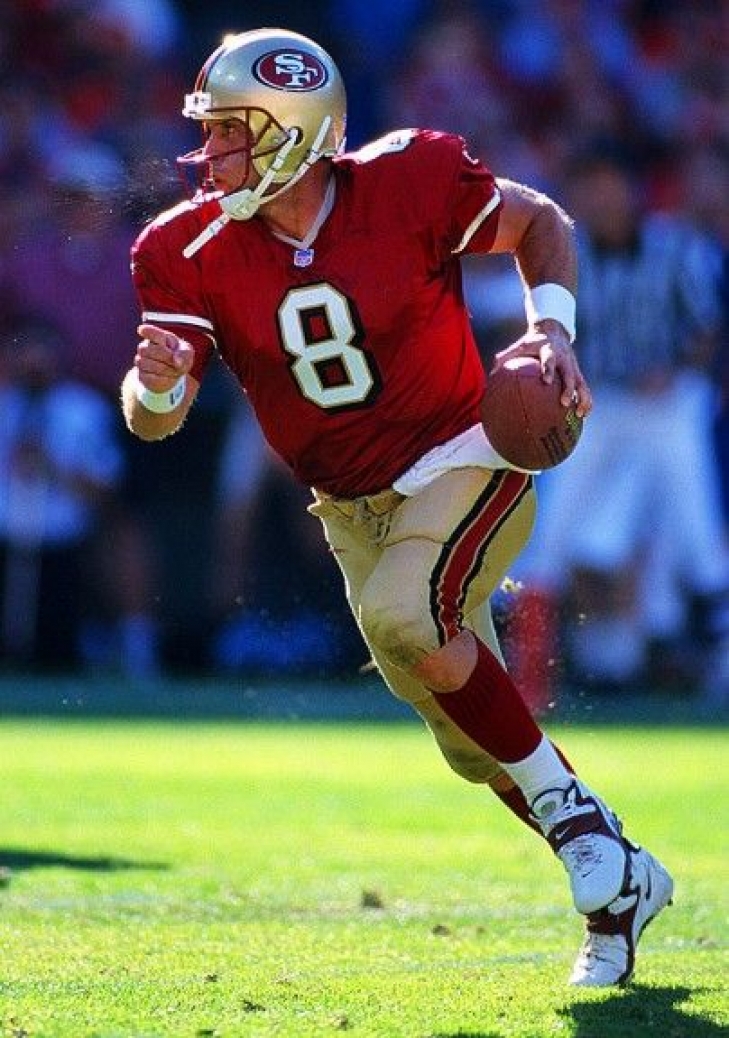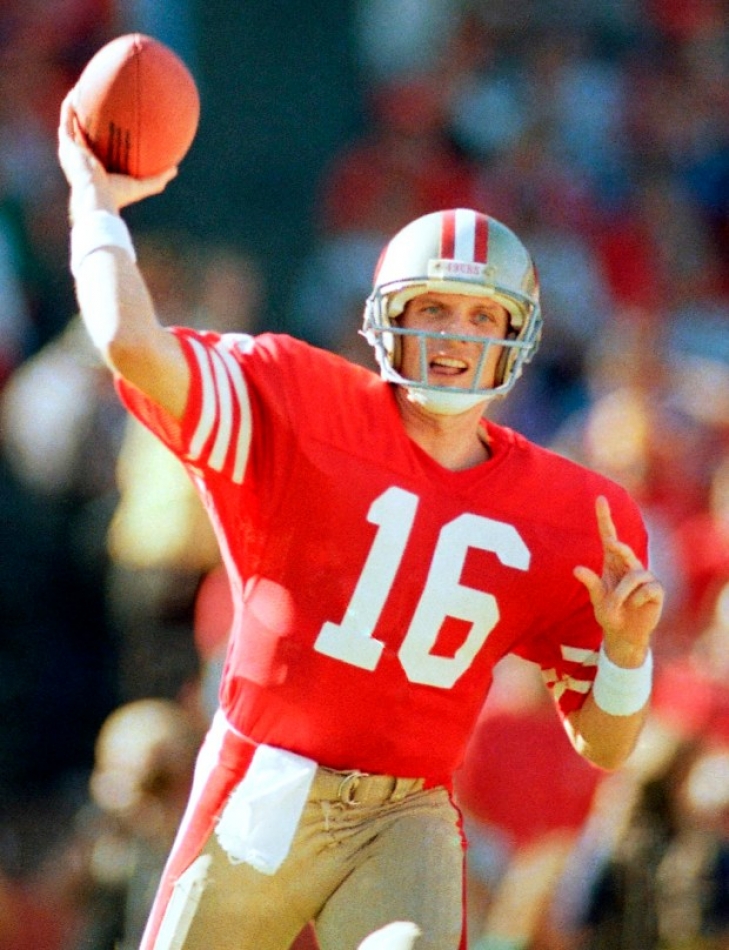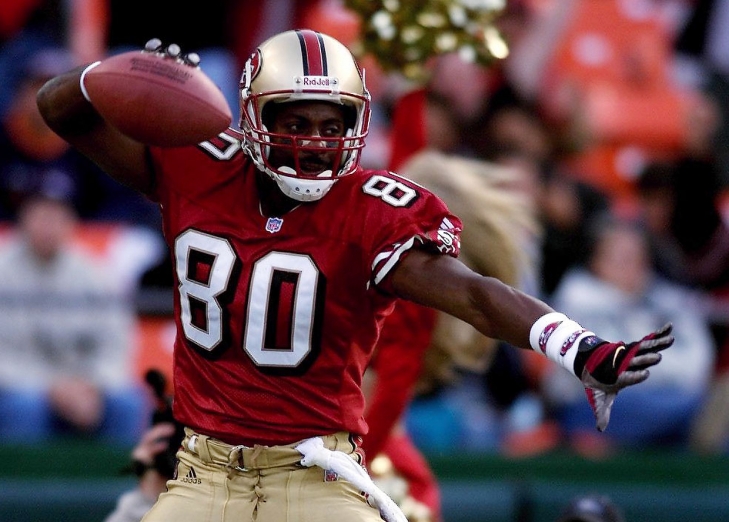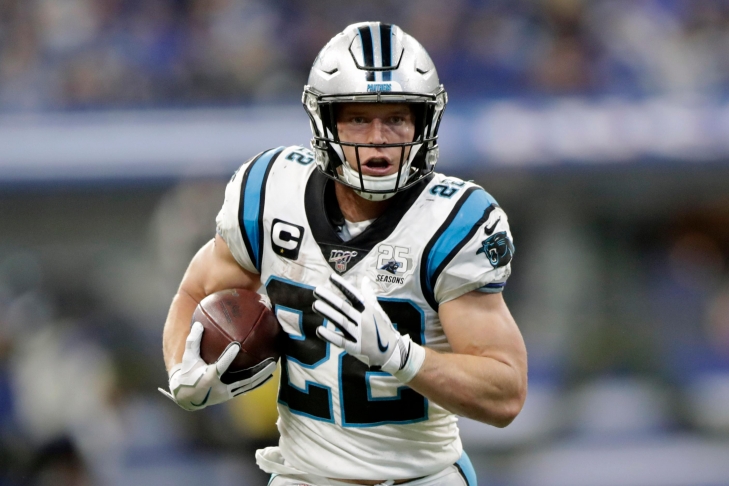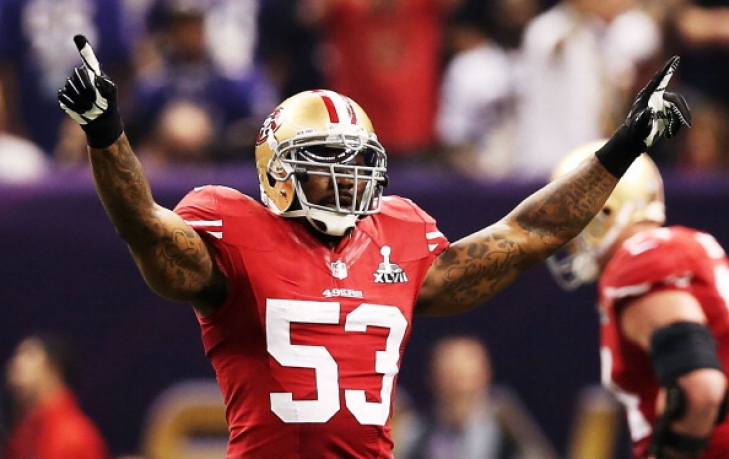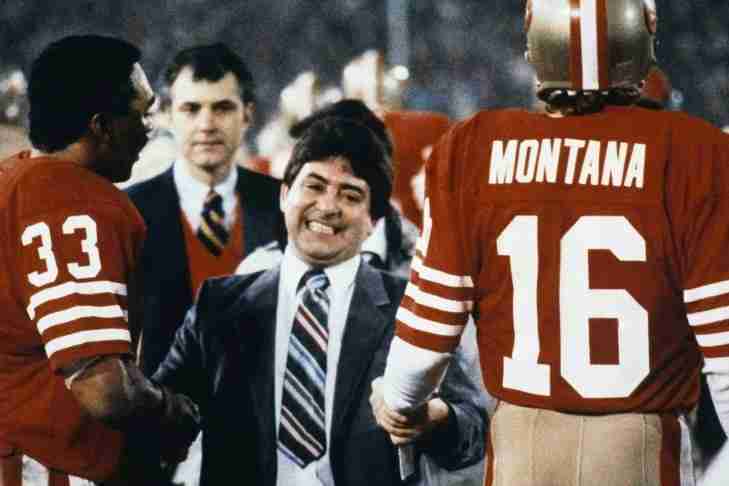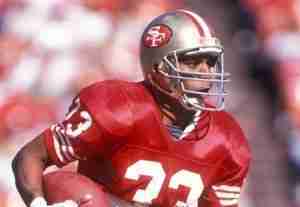3. Steve Young
We were not conflicted in making Jerry Rice the greatest player in the history of San Francisco 49ers. As for who came next, it was not as simple.
Actually, the real question was which Hall of Fame Quarterback would be next, Steve Young or Joe Montana. As you have easily deduced, we decided on Montana, but it was a last-minute decision. It was paper-thin close.
Young was an All-American at BYU, and before the NFL Draft, he signed with the L.A. Express of the USFL, and when that league folded, he signed with the Tampa Bay Buccaneers, who had his rights from the Supplemental Draft. Young's time with the Bucs was not successful, as he only won three games in two years, and the team was horrendous. He was traded to San Francisco to be Joe Montana's understudy, as Tampa took another QB in the Draft, Vinny Testaverde.
4. Ronnie Lott
In the 1980s, The San Francisco 49ers were a high-octane team known primarily for their stars at Quarterback (Joe Montana) and Jerry Rice (Wide Receiver). However, if you are going to be blowing teams out, that means your defense was holding down opponents, which San Francisco did in the 80s through the leadership of Ronnie Lott.
5. Leo Nomellini
A two-time All-American and College Football Hall of Famer from the University of Minnesota, Leo “The Lion” Nomellini was the 11thOverall Pick of the NFL Draft in 1950; a selection that paid dividends for over a decade for the San Francisco 49ers.
2. Joe Montana
A National Champion at Notre Dame in 1977, Joe Montana was a Third Round Pick two years later by the San Francisco 49ers, where he began his pro career as Steve DeBerg’s backup.
1. Jerry Rice
We all know that the San Francisco 49ers have given us multiple Hall of Famers and won several Super Bowls. Despite that, there is no other man that could be debated as the greatest 49er than Jerry Rice, who is also undoubtedly the best Wide Receiver in the game's history.
#42 Overall, George Kittle, San Francisco 49ers, #3 Tight End
2023 Pre-Season Rank #59, 2022 Pre-Season Rank #74, 2021 Pre-Season Rank #86, 2020 Pre-Season Rank #93. Peak Period: 2018-19/2021-23
George Kittle is over the AV/G for Tight Ends, but six years does not a Hall of Fame career make. It is safe to say that behind Travis Kelce,Kittle is regarded as the game's number two Tight End over the last few years, and second bnana to a crrent superstar like Kelce is not bad. If the Niners win a Super Bowl, and Kittle can somehow supplant Kelce as the top TE in football (which could happen this year), it would go a long way for any potential Hall of Fame induction. He has it in him to do it.
#16 Overall, Christian McCaffrey, San Francisco 49ers, #1 Running Back
2023 Pre-Season Rank #55 Pre-Season Rank #66, 2021 Pre-Season Rank #76, 2020 Pre-Season Rank #81. Peak Period: 2017-18/2021-23
McCaffrey had a decent rookie year, a good second year, and a fantastic third season, where he led the NFL in Yards From Scrimmage (2,392) and Touchdowns (19). The Running Back also rushed for over 1,000 Yards and caught passes over 1,000 Yards, a rare feat! Due to injury, he could not follow up in the two years that followed, but when he was healthy in 2022 and returned to Pro Bowl form, he was surrounded by a team that threw in the towel and traded him to San Francisco. McCaffrey is one of the most versatile Running Backs, but his position is meant for ailments.
Last year, we said, “What he does in 2024 might decide whether he has a shot at the Hall”. McCaffrey’s response was to win his first Rushing Title (1,459) and Offensive Player of the Year while also topping the NFL in Yards From Scrimmage (2,023) and Touchdowns (21) for the second time in his career.
294. Bart Oates
In terms of Centers, there are few Professional Football players who can say that they are as successful as Bart Oates.
After being undrafted at BYU in 1983, Oates would join the Philadelphia Stars of the USFL, and he would win championships with them in 1984 and 1985. When the USFL folded, he signed with the New York Giants, where he would become their starting Center, and was named an All-Rookie. The following season would see Oates win another title, this time a Super Bowl Ring when the Giants won Super Bowl XXI. In 1990, Oates and the Giants won another Super Bowl (XXV), but for the first time, he was named to the Pro Bowl.
189. Abe Woodson
Abe Woodson’s regular role was at Cornerback where he would accumulate 19 Interceptions over his career, but it was returning ability that would see him gain five straight Pro Bowls Selections (1959-63)
260. Frankie Albert
Frankie Albert was the 10th overall pick in 1942 by the Chicago Bears, but remember, the year in question was 1942. The Stanford graduate would serve in the Navy for World War II, and upon his return, he would opt to play for his home state for the Los Angeles Bulldogs of the Pacific Coast League, before joining the San Francisco 49ers of the upstart All-American Football Conference.
194. Tim McDonald
156. Gene Washington
A First Round Pick from Stanford in 1969, Gene Washington was part of the turnaround for the San Francisco 49ers from league doormats to respectability. In his first four seasons in the National Football League, Washington would go to the Pro Bowl, with three of those years seeing him earn First Team All-Pro accolades.
214. Bruno Banducci
169. Billy Wilson
Billy Wilson spent his entire career with the San Francisco 49ers, but this was in the 1950s when the Niners were not the world beaters that they would later become, which might be why he doesn’t get his proper due.
#6 Overall, Trent Williams, San Francisco 49ers, Offensive Tackle, #2 Offensive Lineman
2023 Pre-Season Rank #6, 2022 Pre-Season Rank #20, 2021 Pre-Season Rank #33, 2020 Pre-Season Rank #35. 2018-23*
Aging like wine, we love the story of Trent Williams, who was one of the better Offensive Linemen in Washington history, who wanted out after he felt that the team misdiagnised a dermatofibrosarcoma protuberans, a growth that was determined to be a type of cancer in 2019, but was dismissed by the Redskins medical team in 2013. He did not play at all in 2019 and wanted out, landing in San Francisco in 2020, where he has been a First Team All-Pro the last three years and now has the most Pro Bowls (11) of any active Offensive Lineman.
What Williams has accomplished in San Francisco has cemented a bronze bust.
*Williams sat out in 2019.
262. NaVorro Bowman
NaVorro Bowman would prove to be a tackling machine during his time with the San Francisco 49ers and once he became a starter would help usher in a new wave of strong defense for the team. Bowman would be a First Team All Pro in 2011 (despite not making the Pro Bowl) and he finished second overall in Solo Tackles. He would repeat his First Team All Pro performance again in both 2012 and 2013, this time making the Pro Bowl in both years, and in 2012 he helped the Niners reach the Super Bowl, though they would lose to the Baltimore Ravens. From 2011 to 2013 he had 140 Combined Tackles or more, which was good enough for the top ten each year. A torn ACL and MCL cost Bowman the 2014 season but his return in 2015 saw him again reach the Pro Bowl, the First Team All Pro and this time he would lead the NFL in Solo and Combined Tackles.
Terrell Owens to the San Francisco 49ers Hall of Fame
The San Francisco 49ers have announced that Terrell Owens will be the 28thmember of their franchise Hall of Fame.
Owens was a third round pick in 1996 from Tennessee-Chattanooga and as a rookie he would catch 35 passes for 520 Yards. Over the next three seasons, T.O. would move up the ranks and would become the primary receiver with seasons of 936, 1,097 and 754 Yards respectively but in 2000 he would prove himself as an elite wideout with a 1,451 Yard campaign that earned him his first Pro Bowl and First Team All Pro Selection. He would repeat those honors in 2001 and 2002 but would add another accolade he was the NFL leader in Touchdown Receptions. In his final season with the Niners, Owens would again be named a Pro Bowler.
While Owens was certainly a great receiver, he was a controversial player. He was outspoken and could be divisive in locker rooms. Still, T.O. was a phenomenal player who is second all time in franchise history in Receptions (592), Receiving Yards (8,572) and Receiving Touchdowns (81). Owens would later play for Philadelphia, Dallas, Buffalo and Cincinnati and he would be chosen for the Pro Football Hall of Fame in 2018.
We here at Notinhalloffame.com would like to congratulate Terrell Owens for this latest accomplishment!
A look at Eddie DeBartolo Jr.s' PFHOF induction
Now that the Baseball Hall of Fame Class of 2016 has announced their class has done the same. We were hopeful to do this prior to the announcement of the actual inductees, but life, as it often does simply got in the way!
Saying that, we felt it was worth our time to take a look at the 2016 Nominees and debate whether they should have gotten in (or not) and look to the future of the Pro Football Hall of Fame.
7. Roger Craig
It is difficult to understand why Roger Craig had to wait for ten years to be nominated for the Football Hall of Fame, given his strong credentials. Craig was an essential player in every offensive play during his prime. Although he began his career as a fullback, it soon became apparent that he was equally skilled at carrying the ball and blocking for others. In 1986, he made history by becoming the first football player to both rush and catch for 1,000 yards each. Opposing defences were intimidated by his high-knee running style and had to keep a close eye on him during every play.
Craig played a significant role in three Super Bowl Championship teams. Despite his innovative style, he is often overlooked due to the fact that he played alongside some of the most high-prolific offensive stars in football. Critics have suggested that he was merely a beneficiary of the great performances of his teammates, such as Montana and Rice. Nevertheless, Roger Craig was a valuable weapon for the 49ers' offence, and although there may be some debate around his place in the Hall of Fame, he undoubtedly deserved more consideration than he received, although the 2020 Blue Ribbon Finalist spot is a promising sign.
Should Roger Craig be in the Hall of Fame?
44. John Brodie
When you think of great San Francisco quarterbacks, you automatically think of Joe Montana and Steve Young. Before them, there was a very good one named John Brodie who put up great numbers without the supporting cast that Montana and Young had.
John Brodie was one of the game's early gunslingers, and most of the time he had to be. The 49ers of the 1960s were not a great team, and Brodie was often the main reason his team was competitive. By the time the 1970s rolled around, Brodie had a better team around him, and though he was finally playoff-bound, the Niners could not get past the Cowboys for three years in a row. Still, Brodie won the 1970 MVP and was given more respect around the league.
Because he had to take a lot of chances, John Brodie’s interception rate was fairly high, and he finished his career with more picks than touchdown passes. This could be why he has never been a semi-finalist for the Hall, and with the San Francisco 49ers reaching great heights in the 1980s, virtually every Niners star before them has been forgotten. John Brodie deserves better than that.
